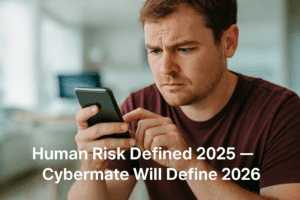It is easy to blame staff for cybersecurity failures. They clicked the wrong link, reused their passwords, and turned off multi-factor authentication. But the truth is, we have created this indifference by making cybersecurity feel irrelevant, complex and disconnected from everyday purpose.
Most training still uses technical terms, focusing on threats and policies. However, staff are not cybersecurity experts, and they should not have to be. What they need is clarity, relevance, and the sense that their choices actually make a difference.
At Cybermate, we believe cybersecurity starts with people, not systems. Our behaviourally driven platform shifts the conversation from compliance to care. We engage staff with messaging that connects to real-world behaviour, cultural context and their values.
Reframing Cyber as a People Problem
More than 80% of breaches involve human error, yet most solutions still frame the problem as technical. That is where we have gone wrong.
Cybermate works by aligning security training with your team’s mindset. We do not just raise awareness; we build behavioural change. Through engaging micro learning, timely nudges and values-aligned content, we guide safer decisions from the inside out.
From Compliance to Care
For schools, charities and not-for-profits, the theme of responsibility carries particular weight. We are called to care for what we are entrusted with — data, systems, relationships and reputation.
Cybermate’s content reflects that. Whether it is safeguarding sensitive student records or protecting organisational integrity, our approach helps teams recognise that cybersecurity is not just an IT task. It is part of their professional commitment.
How Leaders Can Change the Story
- Treat cybersecurity as a cultural issue, not just a technical one
- Choose tools that speak human, not just send automated alerts
- Connect training to purpose, values and everyday impact
- Encourage safe behaviour with recognition, not just reprimands
When staff do not care about cybersecurity, it is not apathy. It is a message not made for them. Let us change that.






